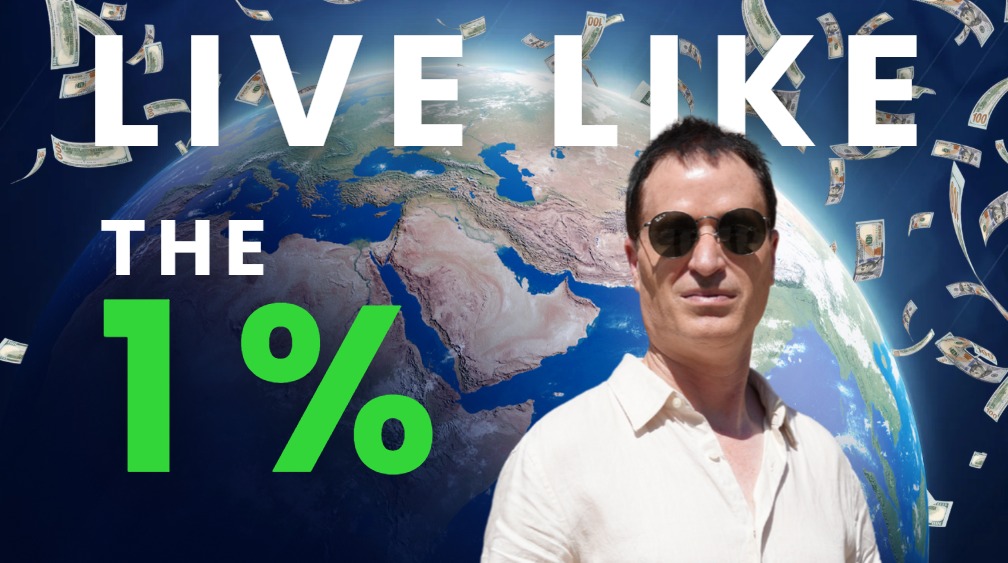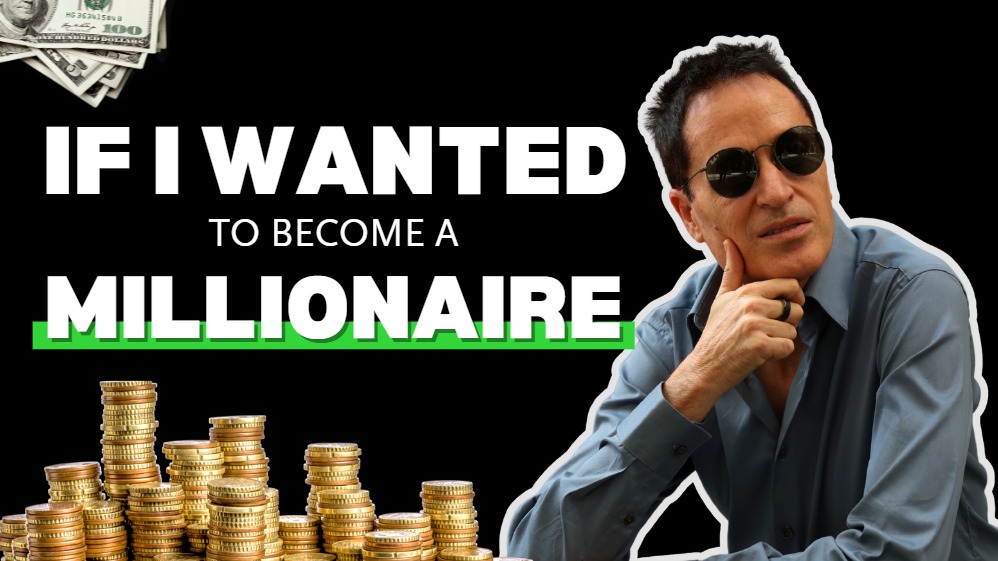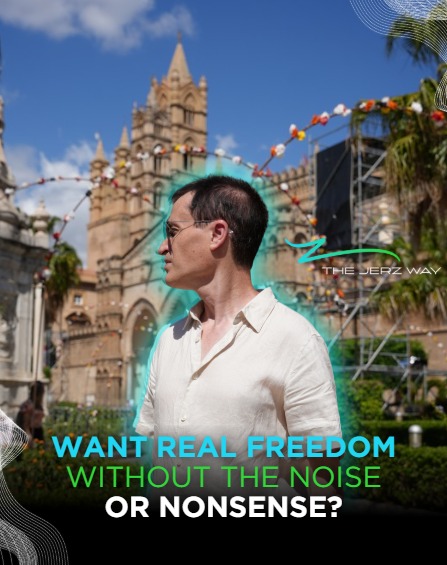September 21, 2025
Escape the SystemHow to Escape the System: Create Your Own Wealth Path

Key Highlights
- The traditional path of get good grades, find a job, and wait for retirement is no longer a guaranteed route to success for most Americans.
- True wealth isn’t about being a billionaire; it’s about having the freedom to do what you want, when you want.
- Successful business owners focus on building structures like businesses and flexible legal entities, not just earning a salary.
- Understanding and using tax rules, like those for futures trading, can significantly lower your effective tax rate and help you build wealth faster.
- Escaping the system requires a long-term mindset, persistence through challenges, and the flexibility to adapt as you grow.
Introduction
For generations, Americans were sold a simple dream: work hard, pay into Social Security, and enjoy a comfortable retirement. But for many today, that dream feels more like a myth. The system that worked for our parents and grandparents seems broken, leaving countless people feeling stuck and powerless. If you've ever felt like you're running on a treadmill, working harder but getting nowhere, you're not alone. The good news is that there’s another way. For aspiring business owners and independent thinkers, a different path exists—one you create yourself.
Understanding "The System" and Why People Want Out

What exactly is "the system"? It's the conventional life script: go to school, get a steady job, buy a house, and save for retirement. This structure was once the bedrock of the American middle class, offering stability and a clear path forward. For many, it represented a fair trade of labor for security.
However, growing inequality and economic shifts have eroded that promise. From the United States to Europe and India, more people are realizing this path no longer leads to prosperity. They see a game that feels rigged, prompting them to look for an exit. Let's explore what this system really is and why so many are losing faith in it.
What Does "The System" Mean in Modern America?
In modern America, "the system" refers to the interconnected economic and social structures that shape our lives. It’s the expectation, reinforced by government policies and cultural norms, that you follow a pre-defined journey: higher education (and the debt that comes with it), a 9-to-5 corporate job, a 30-year mortgage, and reliance on employer-sponsored retirement plans.
When people say they "stop trusting the system," they are questioning the validity of this entire framework. They see that this path often leads to decades of debt and a life spent serving an employer, with true financial freedom remaining out of reach. For a growing number of Americans, these economic systems seem designed to keep them compliant and dependent, not to help them thrive.
This distrust isn't about anarchy; it's about seeking autonomy. It’s the realization that the standard playbook was written for a different era and that following it today may be a recipe for financial stagnation.
Historical Context: How the System Worked for Previous Generations

For the baby boomer generation, the system largely delivered on its promises. After World War II, America experienced an economic boom. Jobs were plentiful, and many companies offered defined-benefit pensions, guaranteeing a steady income in retirement. A single income could often support a family, buy a home, and build savings.
Social Security was seen as a reliable safety net, and the value of investments in the stock market and real estate grew steadily over the long term. The tax rules, while always complex, existed within an economy where wages kept pace with productivity, and a college degree was a near-certain ticket to a stable middle-class life.
This predictability created a deep-seated trust in the traditional path. You put in your time, played by the rules, and the system took care of you. This historical success is why the advice to "get a good job" persists, even though the economic landscape has fundamentally changed.
Trust in Institutions: Why Faith Is Declining
Today, that deep-seated trust has vanished for many Americans. One of the biggest drivers is soaring inequality. People see corporate profits and CEO salaries skyrocketing while their own wages remain flat. The feeling that the rewards are flowing to the top while everyone else is left behind is a powerful reason to lose faith.
The internet has also played a crucial role. Information that was once hidden is now accessible to everyone. We can see how the wealthy use legal loopholes to minimize taxes, witness financial crises caused by institutional recklessness, and read stories of others who have successfully opted out. This transparency exposes the cracks in the system’s foundation.
The consequence of this declining trust is a growing desire for self-reliance. When you believe institutions no longer have your best interests at heart, the only logical step is to take control of your own destiny. This loss of faith is not just cynicism; it's a rational response to a changing world.
Signs That the Traditional Path No Longer Works

The cracks in the system aren't just theoretical; they show up in our daily lives. From stagnant wages to the overwhelming complexity of tax filings, the evidence is all around us. The traditional path feels less like a road to success and more like a trap.
Concepts like "wage slavery" are no longer fringe ideas but describe the reality for millions. At the same time, promises of a secure retirement through pensions and Social Security seem increasingly hollow. These signs are clear warnings that the old map is outdated.
Wage Slavery and Stagnant Salaries
What is wage slavery? It’s the condition of being completely dependent on your salary for survival, forcing you to trade your time—often long hours—for money that barely covers your expenses. You're not technically enslaved, but you lack the freedom to walk away, pursue your passions, or build something of your own because you're trapped in a cycle of earning just enough to get by.
This feeling is directly linked to losing faith in economic systems. When you work hard but your salary doesn't keep up with inflation, you start to question the fairness of the arrangement. Many Americans feel this acutely, working more than ever but seeing their purchasing power decline.
The system promises that hard work pays off, but the reality of wage slavery suggests otherwise. It implies that your labor primarily benefits your employer, leaving you with little to show for your most valuable asset: your time. This disconnect is a major reason people seek an escape.
The Reality of Taxes and Diminishing Returns
For salaried employees, taxes represent a significant hurdle to wealth creation. Before you even see your paycheck, a large portion is removed for federal, state, and local taxes. Your effective tax rate can be shockingly high, especially as you earn more, making it difficult to save and invest meaningfully.
The tax rules seem to be written for business owners and investors, not for wage earners. While employees have limited options for deductions, entrepreneurs can leverage a wide array of strategies to lower their tax burden. Your annual tax filings often feel like an exercise in handing over a huge chunk of your hard-earned money with little control.
This is a core part of the broken system. The wealthy don't get rich by earning a W-2 salary and paying a 40% effective tax rate. They build structures and use the tax code to their advantage—a playbook most people are never taught.
Pensions, Retirement, and Broken Promises
Decades ago, pensions were a cornerstone of retirement. Companies guaranteed their employees a fixed income for life. Today, those pensions are nearly extinct in the private sector, replaced by 401(k)s and other defined-contribution plans. This shift transferred all the risk from the employer to the employee.
Now, your retirement security depends entirely on your ability to save and the performance of the stock market. At the same time, the future of Social Security is uncertain. Many younger people worry it won't be there for them in the same way it was for previous generations.
These broken promises are a major source of institutional distrust. The promise of a secure retirement in exchange for a lifetime of work has been withdrawn, leaving people feeling anxious and abandoned. The consequence is that individuals are realizing they must create their own retirement plan, independent of these failing systems.
What It Means to "Escape the System"

Escaping the system doesn't mean moving off the grid or rejecting society. It means consciously opting out of the traditional career path and building your own framework for wealth and freedom. It's a fundamental shift from being a passive participant to an active creator of your own life.
For many, this looks like becoming business owners, freelancers, or savvy investors who leverage the internet and favorable tax benefits to their advantage. It’s about redefining success on your own terms. We'll explore this mindset shift and what it truly means to be free.
Freedom Versus Wealth: Redefining Success
When most people think of wealth, they picture mansions and private jets. But for those escaping the system, wealth means something different: freedom. It’s the ability to wake up without an alarm, decide how you spend your day, work on projects you care about, and live where you want.
This redefines the goal. The objective isn't to accumulate a billion dollars; it's to generate enough income from your own structures to be independent of a job. The true value of investments isn't just their monetary worth but the autonomy they provide. Many Americans would feel far wealthier with $100,000 in passive income and complete freedom than with a $500,000 salary that requires 80-hour workweeks.
"Stopping to trust the system" means you stop measuring success by its standards (job title, salary) and start measuring it by your own (freedom, control, fulfillment).
The Mindset Shift: Stop Trusting, Start Building
The first and most critical step is a mindset shift. You have to stop waiting for permission or relying on traditional credentials to validate you. A successful business is built on solving problems and providing value, not on having the right diploma. You must move from an employee mindset to an owner mindset.
An employee waits for instructions, while an owner looks for opportunities. An employee sees their salary as their worth, while an owner focuses on building assets that generate income. This change in perspective is more important than any business plan or funding.
To start building, you must adopt these core principles:
- Focus on structures, not salaries: Build systems (a business, a brand, an investment portfolio) that can grow without your direct labor.
- Persist through failure: Your first, second, or third idea might not work. The key is to learn and keep going.
- Think long-term: This isn't a get-rich-quick scheme. It’s about patiently building a foundation for lasting freedom.
Real-Life Consequences of Staying "In the System"
What happens if you choose to stay on the conventional path? For some, it may still lead to a comfortable life. But for an increasing number of Americans, the consequences are stark. You risk a lifetime of wage slavery, where you're always one or two paychecks away from financial trouble.
You remain vulnerable to corporate decisions beyond your control, like layoffs or restructuring. Your ability to build real wealth is capped by your salary and severely limited by taxes. As inequality continues to grow, you may find yourself working harder just to maintain your standard of living, with little hope of getting ahead.
Essentially, staying in the system means accepting a life where you have limited control over your time and your finances. It means your fate is tied to the stability of institutions that are proving to be less and less reliable. This is the reality that drives people to seek a different way.
Inspiring Examples: People Who Created Their Own Wealth Path

The idea of breaking free can feel abstract, but countless people have already done it. These are not just famous billionaires; they are everyday entrepreneurs, artists, and innovators who decided to build their own paths instead of following the one laid out for them.
Their stories prove that it's possible to achieve financial freedom on your own terms. From business owners who spotted a unique market need to creatives who monetized their passion, these examples provide a blueprint for what's possible.
Entrepreneurs Who Built Businesses Outside Conventional Models
Entrepreneurs are the classic example of people who break free. They see a problem or an unmet need and build a solution, creating value where none existed. Many successful business owners don't follow a traditional path; they forge their own.
Consider the entrepreneurs who built e-commerce brands from their living rooms, or the software developers who created a niche app that solved a specific problem. These individuals didn't wait for a promotion; they created their own opportunities. They break free from systematic constraints by refusing to accept the limits of a 9-to-5 job.
Their success often comes from:
- Identifying a niche market ignored by large corporations.
- Leveraging technology to operate with low overhead.
- Building a direct relationship with their customers.
- Relentlessly iterating and improving their product or service.
Artists and Creatives Living on Their Own Terms
For decades, artists and creatives were at the mercy of gatekeepers: publishing houses, record labels, and art galleries. The internet has completely changed that dynamic. Today, creatives can build an audience and monetize their work directly, allowing them to live on their own terms.
Musicians can release their music on platforms like Spotify and Bandcamp, writers can self-publish on Amazon or start a paid newsletter, and visual artists can sell their work directly to fans through social media. These platforms allow them to bypass the traditional industry and keep a much larger share of the revenue.
They break free by building a community around their work. By connecting directly with their audience, they create a loyal following that is willing to support them financially, giving them the freedom to create without compromising their vision. It's a powerful model for anyone with a creative talent.
Case Studies: Digital Nomads & Lifestyle Designers
Digital nomads are a prime example of people who have successfully designed a life outside the traditional system. Using the power of the internet, they've decoupled their income from their location. This allows them to work from anywhere in the world, whether it's a cafe in London, a co-working space in India, or a beach in Thailand.
These individuals often work as freelance writers, consultants, software developers, or run online businesses. They escape the high cost of living in cities like San Francisco while often earning a strong income, dramatically increasing their ability to save and invest. Their success is a testament to the power of a location-independent career.
Lifestyle design is about consciously choosing a life that aligns with your values, rather than accepting the one prescribed to you. Digital nomads are pioneers in this movement, proving that you don't need a fixed office or a permanent address to build a successful and fulfilling life.
How Structures Can Set You Free

The secret that wealthy business owners understand is that freedom comes from structures. A salary is just income, but a business is a structure. A mortgage is a liability, but a portfolio of cash-flowing real estate is a structure. These frameworks are what separate the employee from the truly independent.
By building the right legal and financial structures, you can protect your assets, optimize your taxes using specific tax rules for LLCs, and create systems that generate wealth for you. Let's look at how you can move from earning a salary to building these powerful structures.
From Salaries to Business Ownership
The transition from an employee mindset to that of a business owner is the most crucial step. As an employee, you trade time for money. Your income is limited by the number of hours you can work and what your employer is willing to pay. You are a cog in someone else's machine.
Business owners, on the other hand, build the machine. They create systems, processes, and products that can generate revenue independently of their direct time. A successful business is an asset that works for you, rather than you working for it. This is how entrepreneurs break free from the constraint of exchanging time for money.
This doesn't mean you have to invent the next Google. It can start with a simple service, a small online store, or a consulting practice. The key is to stop thinking about salaries and start thinking about creating a scalable, income-generating asset.
Flexible Entities: LLCs, Trusts, and Offshore Accounts
Once you start generating income outside of a salary, you need structures to protect and manage it. This is where flexible legal entities come in. They are tools that the wealthy have used for generations to separate their personal assets from their business liabilities and optimize their financial affairs.
Entities like Limited Liability Companies (LLCs), trusts, and even offshore accounts (when used legally) provide layers of protection and financial flexibility. An LLC can shield your personal savings if your business is sued. A trust can help manage assets for your family's future. These are not just for the super-rich; they are accessible tools for any serious entrepreneur.
Here’s a simple breakdown of these structures:
.jpeg)
These are used worldwide, from the US to Europe and India, as foundational wealth-building tools.
Building Cash Flow Instead of Chasing Mortgages
The traditional system teaches you to get a mortgage and spend 30 years paying off a house, which is primarily a liability during that time. The wealth-builder's mindset focuses on acquiring assets that produce positive cash flow—money that comes into your pocket every month.
Instead of chasing a single large mortgage for a primary residence, you could focus on acquiring cash-flowing assets first. This could be a rental property, a dividend-stock portfolio, or a business that generates predictable monthly profit. The goal is to build multiple streams of income that cover your living expenses.
Practical steps to focus on cash flow include:
- Investing in real estate that generates rental income.
- Building a business with recurring revenue (e.g., subscriptions).
- Creating a portfolio of dividend-paying stocks.
- Licensing intellectual property for royalties.
Once your cash flow from these assets exceeds your expenses, you are financially free. This is a far more powerful position than simply owning a heavily mortgaged home.
Beginner’s Guide: Creating Your Own Wealth Path

Starting this journey can feel intimidating, but it's more accessible than ever. You don't need a fancy degree or a pile of cash. What you do need is the right mindset, a willingness to learn new skills, and the persistence to see it through.
The internet provides all the resources you need, often for free. You can learn almost any skill, connect with mentors, and start a business with minimal upfront cost. Forget about traditional credentials; focus on what you need to get started right now.
What You’ll Need to Get Started (Skills, Resources, Mindset)
To begin creating your own path, you'll need to focus on three key areas. First and foremost is your mindset. You must cultivate resilience, embrace uncertainty, and adopt a long-term perspective. This journey is a marathon, not a sprint, and your mindset will determine whether you finish.
Next, you need to acquire practical skills. In today's digital world, high-income skills like sales, copywriting, digital marketing, and coding are incredibly valuable and can be learned online. You don't need formal credentials; you need to be able to deliver results. The internet offers endless resources, from YouTube tutorials to online courses, to help you get started.
Finally, here are the essential resources and attitudes you'll need:
- A problem-solving attitude: See challenges as opportunities to learn and grow.
- Financial literacy: Learn the basics of budgeting, investing, and taxes.
- A strong work ethic: Freedom isn't free; it's built on a foundation of hard, smart work.
- Patience: Building real wealth and independence takes time.
Common Mistakes Beginners Make
Many people who try to escape the system make a few common mistakes that derail their progress. One of the biggest is quitting too soon. Building a business or a portfolio takes time, and initial results are often slow. Impatience leads many to give up right before they might have seen a breakthrough.
Another major error is ignoring the financial and legal side of things. Many new entrepreneurs focus only on their product or service and neglect important tasks like proper bookkeeping and tax filings. This can lead to serious problems down the road and prevents them from taking advantage of strategies to pay less taxes legally.
Finally, many beginners fall victim to "shiny object syndrome," constantly jumping from one idea to the next without ever committing to one. True success comes from focusing your energy on a single path long enough for it to bear fruit, not from chasing every new trend.
Assessing Your Current Situation
Before you can build your escape plan, you need to know your starting point. Take a brutally honest look at your current situation. This means assessing your finances, your skills, and your personal commitments. How much debt do you have? What are your monthly expenses?
Next, take inventory of your assets. This isn't just about money. Your assets also include your skills, your network, your time, and any existing resources you have. Do you have a spare room you could rent out for cash flow? Do you have writing skills you could monetize as a freelancer?
For many Americans, this assessment can be daunting, but it's a necessary first step. Understanding where you stand allows you to create a realistic, actionable plan. Whether your goal is to invest in real estate or start an online business, knowing your starting point is the first step toward creating your own path.
Step-by-Step Guide to Escaping the System
.jpeg)
Now that you understand the mindset and have assessed your starting point, it's time for a practical, step-by-step guide. Escaping the system is a process, not a single event. It involves a series of deliberate actions designed to build independence over time.
This path is for aspiring business owners and anyone ready to take control. From adopting the right mindset to optimizing your tax filings, each step builds on the last, moving you closer to your goal of financial freedom. Let's break down the process.
Step 1: Adopt a Wealth-Building Mindset
Everything begins with your mindset. Before you take any external action, you must fundamentally change how you think about money, work, and wealth. Stop thinking like an employee who trades time for dollars and start thinking like a business owner who builds systems that generate value.
This means embracing calculated risks, seeing failure as a learning opportunity, and focusing on creating assets rather than just earning income. A wealth-building mindset is proactive, not reactive. You don't wait for opportunities to come to you; you go out and create them.
Read books, listen to podcasts, and surround yourself with content from successful entrepreneurs. Immerse yourself in the thinking of those who have already built the life you want. This internal shift is the foundation upon which all external success is built.
Step 2: Identify Your Strengths and Income Opportunities
Once your mindset is right, it's time to identify how you can generate income outside of a traditional job. Look at your unique strengths, skills, and interests. What problems can you solve for other people? Your first independent income stream will likely come from something you already know or are good at.
Don't get hung up on credentials. The market pays for results, not diplomas. Can you write compelling copy? Manage social media accounts? Build simple websites? These are all valuable skills that people and businesses are willing to pay for. Start with what you have.
Brainstorm a list of potential income opportunities based on your strengths. Look for problems you can solve in a niche you understand. Your goal here is to find a viable path to your first dollar earned outside of a salary. This proves the concept and builds momentum.
Step 3: Build Structures—Business, Investments, or Side Hustles
With an idea in hand, it's time to start building. This is where you create your first structure. It could be a small side hustle you run in the evenings, a freelance business, or your first foray into investments. The key is to start small, manage your risk, and learn as you go.
If you're starting a business, focus on getting your first paying customer as quickly as possible. This validates your idea and provides crucial feedback. If you're focusing on investments, start with a small amount of capital and learn the ropes before committing significant funds.
The goal of this step is to create an income stream, no matter how small, that is separate from your job. This first structure is your foothold outside the system. It's the foundation you will build upon over time.
Step 4: Optimize Taxes and Protect Assets
As you start generating income, you must immediately shift your thinking about taxes. Instead of seeing taxes as something that just happens to you, view the tax code as a system of incentives. The government provides tax benefits for activities it wants to encourage, like starting a business or investing.
For example, sophisticated futures traders use the 60/40 rule under IRS Section 1256 to their advantage. This rule allows 60% of their gains to be taxed at the lower long-term capital gains rate, regardless of how long they held the position. This is a powerful way to pay less taxes, and it's a perfect example of how the wealthy use tax rules that most employees don't even know exist. You report these gains on IRS Form 6781 [Source: https://www.irs.gov/forms-pubs/about-form-6781].
To start optimizing, you should:
- Form an LLC to separate your business and personal finances.
- Diligently track all your business expenses for deductions.
- Consult with a tax professional who specializes in small business owners.
- Learn about the specific tax benefits available in your industry.
Step 5: Stay Flexible and Evolve as You Grow
Your first business or investment strategy may not be your last. The path to freedom is not a straight line. Markets change, new opportunities arise, and your own interests may evolve. The key to long-term success is to stay flexible and be willing to adapt.
As your income and assets grow, your structures will need to evolve with you. What worked as a solo freelancer may not work for a business with five employees. Your initial investment strategy may need to be adjusted as your risk tolerance and capital base change. This constant process of growth and adaptation is essential.
Embrace a mindset of continuous learning. Stay curious, be open to new ideas, and never become so attached to one strategy that you're unwilling to pivot when necessary. This flexibility is what will ensure your continued independence and growth for years to come.
Practical Strategies for Independent Living
Achieving true independent living goes beyond just earning money differently; it involves rethinking your relationship with traditional financial institutions. For some, this means exploring strategies that offer greater privacy, asset protection, and freedom from a single country's banking system.
Advanced tools like offshore accounts, alternative banking solutions, and cryptocurrencies are part of this landscape. While not for beginners, understanding these options is part of a complete education in financial sovereignty. Let's examine some of these practical strategies.
Moving Your Finances Offshore: Risks and Rewards

Moving finances to offshore accounts is a strategy used by global citizens and sophisticated investors for asset protection and diversification. The primary reward is separating your wealth from the legal and political risks of a single country. A bank account in a stable jurisdiction like Switzerland or Singapore can offer a layer of protection against frivolous lawsuits or economic instability at home.
However, the risks are significant. The world of offshore banking is complex and requires strict adherence to tax laws in your home country, like the IRS's reporting requirements for Americans. Missteps can lead to severe legal and financial penalties. It is not a tool for illegal tax evasion.
Key considerations for offshore accounts include:
- Rewards: Geographic diversification, asset protection, access to international investment opportunities.
- Risks: High compliance costs, complex legal and tax reporting, potential for scams.
- Legality: It is legal but requires transparent reporting to tax authorities like the IRS.
- Best Use: For significant assets as part of a sophisticated global diversification strategy.
Alternative Banking, Crypto, and Decentralized Options
For those seeking independence from traditional finance, the rise of cryptocurrencies and decentralized finance (DeFi) offers compelling alternatives. Unlike traditional bank accounts, crypto assets like Bitcoin and Ethereum can be held directly by you, without an intermediary. This provides a high degree of censorship resistance and control.
Decentralized platforms built on the internet allow you to lend, borrow, and trade assets without ever going through a bank. These systems are open, global, and operate 24/7. However, they are also new, volatile, and largely unregulated, carrying a high degree of risk.
While not a replacement for traditional banking for most people yet, these alternative and decentralized options represent a radical experiment in financial self-sovereignty. They offer a glimpse into a future where individuals can have far more control over their financial lives, fully independent of the old-guard institutions.
Conclusion
In conclusion, escaping the traditional system requires dedication, resilience, and a willingness to redefine your understanding of success. By shifting your mindset from one that seeks a stable salary to one that embraces building structures—like businesses and investments—you can pave your own wealth path. The stories of those who have successfully transitioned out of wage slavery into lives of freedom serve as inspiration. Remember, the journey is not just about financial gain; it’s about creating a lifestyle that reflects your values and aspirations. If you're ready to take the first step toward your own wealth path, get a free trial consultation with our experts to explore your options.
Frequently Asked Questions

Is escaping the system legal and safe in the United States?
Absolutely. Escaping the system is about legally building a successful business and using the tax rules to your advantage. It involves forming legitimate business entities, claiming all legal deductions, and complying with all IRS regulations. It's not about evading taxes but about playing the game smarter, completely within the legal framework of the United States.
What are the biggest risks when leaving traditional systems?
The biggest risks are income instability, especially in the beginning, and making legal or financial mistakes. More advanced strategies like using offshore accounts come with their own set of compliance risks if not handled correctly. The journey requires a high degree of personal responsibility and a willingness to navigate uncertainty.
Can you really live like the top one percent without family wealth?
Yes, but it's important to redefine "living like the top one percent." If it means having complete freedom over your time, it is absolutely achievable for many Americans through building a successful business or smart investments. It's about creating financial independence, not necessarily becoming a billionaire, and that doesn't require family wealth.
Stay Connected
The game of wealth, freedom, and protection is global, don’t play it alone.
Follow The Jerz Way across platforms for daily strategies, insider plays, and stories they’ll never teach you in school:
X (Twitter): @TheJerzWay — raw thoughts, daily fire, and tax-free tactics in real time.
Instagram: @TheJerzWay — lifestyle, behind-the-scenes, and quick wealth hacks.
YouTube: The Jerz Way — deep dives on residency, banking, and global freedom strategies.
LinkedIn: Jeremy Kreisler – The Jerz Way — professional insights, case studies, and asset protection frameworks
02
Action Plan & Document Collection
We create a tailored action plan aligned with your chosen service(s). This stage includes gathering required documents and handling essential tasks such as translations, apostilles, and genealogical research.
